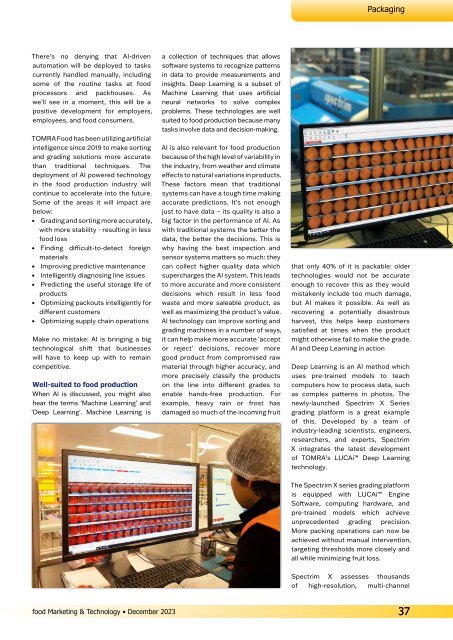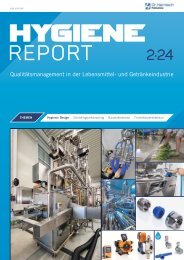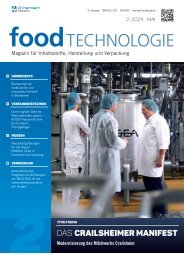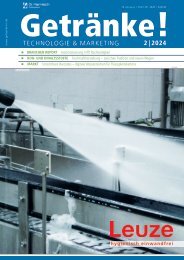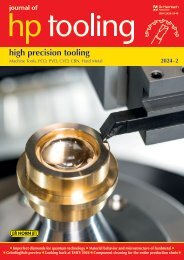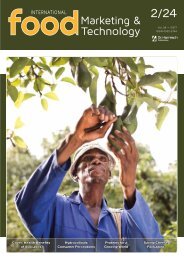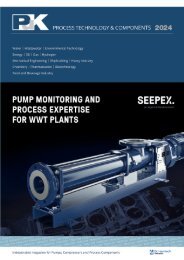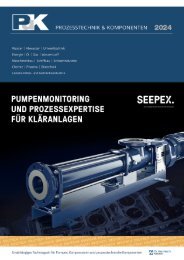food Marketing - Technology 6/2023
food Marketing & Technology is the international magazine for executives and specialists in the food industry.
food Marketing & Technology is the international magazine for executives and specialists in the food industry.
You also want an ePaper? Increase the reach of your titles
YUMPU automatically turns print PDFs into web optimized ePapers that Google loves.
Packaging<br />
There’s no denying that AI-driven<br />
automation will be deployed to tasks<br />
currently handled manually, including<br />
some of the routine tasks at <strong>food</strong><br />
processors and packhouses. As<br />
we’ll see in a moment, this will be a<br />
positive development for employers,<br />
employees, and <strong>food</strong> consumers.<br />
TOMRA Food has been utilizing artificial<br />
intelligence since 2019 to make sorting<br />
and grading solutions more accurate<br />
than traditional techniques. The<br />
deployment of AI powered technology<br />
in the <strong>food</strong> production industry will<br />
continue to accelerate into the future.<br />
Some of the areas it will impact are<br />
below:<br />
• Grading and sorting more accurately,<br />
with more stability - resulting in less<br />
<strong>food</strong> loss<br />
• Finding difficult-to-detect foreign<br />
materials<br />
• Improving predictive maintenance<br />
• Intelligently diagnosing line issues<br />
• Predicting the useful storage life of<br />
products<br />
• Optimizing packouts intelligently for<br />
different customers<br />
• Optimizing supply chain operations<br />
Make no mistake: AI is bringing a big<br />
technological shift that businesses<br />
will have to keep up with to remain<br />
competitive.<br />
Well-suited to <strong>food</strong> production<br />
When AI is discussed, you might also<br />
hear the terms ‘Machine Learning’ and<br />
‘Deep Learning’. Machine Learning is<br />
a collection of techniques that allows<br />
software systems to recognize patterns<br />
in data to provide measurements and<br />
insights. Deep Learning is a subset of<br />
Machine Learning that uses artificial<br />
neural networks to solve complex<br />
problems. These technologies are well<br />
suited to <strong>food</strong> production because many<br />
tasks involve data and decision-making.<br />
AI is also relevant for <strong>food</strong> production<br />
because of the high level of variability in<br />
the industry, from weather and climate<br />
effects to natural variations in products.<br />
These factors mean that traditional<br />
systems can have a tough time making<br />
accurate predictions. It’s not enough<br />
just to have data – its quality is also a<br />
big factor in the performance of AI. As<br />
with traditional systems the better the<br />
data, the better the decisions. This is<br />
why having the best inspection and<br />
sensor systems matters so much: they<br />
can collect higher quality data which<br />
supercharges the AI system. This leads<br />
to more accurate and more consistent<br />
decisions which result in less <strong>food</strong><br />
waste and more saleable product, as<br />
well as maximizing the product’s value.<br />
AI technology can improve sorting and<br />
grading machines in a number of ways,<br />
it can help make more accurate ‘accept<br />
or reject’ decisions, recover more<br />
good product from compromised raw<br />
material through higher accuracy, and<br />
more precisely classify the products<br />
on the line into different grades to<br />
enable hands-free production. For<br />
example, heavy rain or frost has<br />
damaged so much of the incoming fruit<br />
that only 40% of it is packable: older<br />
technologies would not be accurate<br />
enough to recover this as they would<br />
mistakenly include too much damage,<br />
but AI makes it possible. As well as<br />
recovering a potentially disastrous<br />
harvest, this helps keep customers<br />
satisfied at times when the product<br />
might otherwise fail to make the grade.<br />
AI and Deep Learning in action<br />
Deep Learning is an AI method which<br />
uses pre-trained models to teach<br />
computers how to process data, such<br />
as complex patterns in photos. The<br />
newly-launched Spectrim X Series<br />
grading platform is a great example<br />
of this. Developed by a team of<br />
industry-leading scientists, engineers,<br />
researchers, and experts, Spectrim<br />
X integrates the latest development<br />
of TOMRA’s LUCAi Deep Learning<br />
technology.<br />
The Spectrim X series grading platform<br />
is equipped with LUCAi Engine<br />
Software, computing hardware, and<br />
pre-trained models which achieve<br />
unprecedented grading precision.<br />
More packing operations can now be<br />
achieved without manual intervention,<br />
targeting thresholds more closely and<br />
all while minimizing fruit loss.<br />
Spectrim X assesses thousands<br />
of high-resolution, multi-channel<br />
<strong>food</strong> <strong>Marketing</strong> & <strong>Technology</strong> • December <strong>2023</strong> 37


